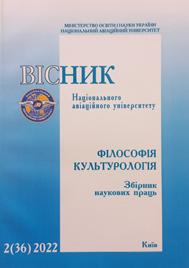TRADITIONAL AND MODERN IN THE MASS CONSCIOUSNESS STRUCTURE (IN THE CONTEXT OF INTER-CIVILIZATIONAL CHALLENGES)
DOI:
https://doi.org/10.18372/2412-2157.36.16972Keywords:
ordinary level of consciousness, being, age conflicts, mass consciousness, mythologems, inter-civilizational interaction, neoreligions, religious consciousness, worldview, social consciousness, the structure of massconsciousness, traditionsAbstract
Introduction. Mass consciousness has a complex structure that includes stable and dynamic components, different levels, and a
certain direction of its development processes. Social practice acquired distinct features of intercultural interaction in the conditions of
inter-civilizational challenges. The aggravation of the conflict phases of these processes makes their retrospective analysis relevant, in
particular through the concept of age conflict. The aim and tasks are an analysis of the structure of modern mass consciousness, and
the ratio of different worldview elements in its composition in the context of modern inter-civilizational challenges. Research methods are
primarily the dialectical approach in interpreting the interaction of levels and forms of social consciousness, including the relationship
between consciousness and being. The dialectical approach was complemented by the civilizational approach, in particular when
analyzing issues in the context of age conflicts. Research results. The structure of modern mass consciousness is characterized by a
certain dynamism and demonstrates a change in the forms of its manifestation. In Ukrainian society, in the structure of the mass
everyday consciousness, several components are represented as certain «mental formations». Іntercivilizational interaction took on the
features of a social conflict as an acute phase of the development of certain age-old conflicts that arose in the past and developed over
many decades. Discussion. These features of the structure of modern mass social consciousness are due to a number of reasons
related to the spread of values of industrial civilization with its secularization, the development of urban structures, scientific and
technological progress, and rationalism. At the root of age-old conflicts is the struggle of social systems, in particular, their political
systems or ideological doctrines, which is also manifested in the field of international relations. Age conflicts can be of different natures:
inter-formational and intra-formational, internal (civil conflicts), and external (interstate). Conclusion. The dynamism of the modern
mass everyday consciousness is manifested by several components as certain «mental formations» in its structure. The current socioeconomic
and political situation in Ukrainian society contributes into the activation of various non-traditional religious movements, the
formation of ideologemes associated with different value orientations, and acting as the leading ideological dominants of mass
consciousness. Familiarization with the historical features of the course of age-old conflicts in the inter-civilizational context shows the
relevance of analyzing these issues in order to find ways to peacefully resolve such conflicts, which will be an important step on the way
from inter-civilizational confrontation to cooperation between peoples and countries.
References
Академічне релігієзнавство / Бабій М. Ю. та ін. ; за ред. А. М. Колодного. К. : Світ Знань, 2000. 864 с.
Баркер А. Нові релігійні рухи. СПб., 1997. 282 с.
Боровський Я. Є. Світогляд давніх киян. К. : Наукова думка, 1992. 176 c.
Гуцуляк О. Б. Неоязичництво другої половини ХХ ст. як парадигма свідомості суб’єкта цивілізаційно-культурного процесу.
Людина і політика. № 3. 2000. С. 64-68.
Дротянко Л. Г. Ментальний аспект комунікації в полікультурному середовищі в умовах глобалізації. Вісник Національного авіаційного університету. Серія: Філософія. Культурологія. № 2 (18). К. : НАУ, 2013. С. 5-8.
Дудар Н. П. Детермінанти сучасного стану релігійності. Людини і політика. № 2. 2003. С. 93-110.
Єленський В. Є. Релігійність в українському суспільстві. Людина і світ. № 10. 2001. С. 20-25.
Єленський В. Є. Розлам. Протистояння в українському православ’ї як конфлікт ідентичності. Людина і світ. № 6. 2000. С. 2-10.
Здіорук С. І. Суспільно-релігійні відносини: виклики України ХХІ сторіччя : Монографія. К.: Знання України, 2005. 551 с.
Крянєв Ю. В., Павлова Т. П. Двовірство на Русі. Як була хрещена Русь. М. : Політвидав, 1988. С. 362-374.
Лобовик Б. О. Релігійна свідомість та її особливості. К. : Наукова думка, 1986. 247 с.
Лобовик Б. О. Буденна релігійна свідомість. Гносеологічний аналіз. К. : Видавництво Київського університету, 1971. 174 с.
Любащенко В. І. Історія протестантизму в Україні : Курс лекцій. Львів : Видавнича Спілка «Просвіта», 1995. 350 с.
Матюхіна О. А. Комунікативний простір української культури кінця XIX – початку XX як фактор розвитку національної самосвідомості. Вісник Національного авіаційного університету. Серія: Філософія. Культурологія. №1(33). К.: НАУ, 2021. С.122-126.
Міщенко М. Д. Особливості сприйняття ідеологем прихильниками різних політичних течій. Соціологія: теорія, методи, маркетинг. № 3. 2000. С. 42-50.
Новіков М. П. Християнізація Київської Русі: методологічний
аспект. М. : Вид-во Московського університету, 1991. 176.
Рязанова Л. С. Релігійне відродження в Україні: соціо-
культурний контекст. К. : Біла Криниця, 2004. 239 с.
Рязанова Л. С. Релігійний ренесанс: спроба соціологічної
діагностики. Соціологія: теорія, методи, маркетинг. № 4. 2001.
С. 114-125.
Тойнбі А. Дослідження історії. Т. 1 : Скорочена версія томів
I-VI Д. Ч. Сомервелла / пер. В. Митрофанов, П. Таращук. К. :
Основи, 1995. 617 с.
Тойнбі А. Дослідження історії. Т. 2 : Скорочена версія томів
VII-X Д. Ч. Сомервелла / пер. В. Митрофанов, П. Таращук. К. :
Основи, 1995. 401 с.
Хабермас Ю. Віра та знання. Майбутнє людської природи.
М.: Вид-во «Весь Світ», 2002. С. 115-131.
Хайдеггер М. Час та буття. Розмова на дорозі. М.: Вища
школа, 1991. С. 81-86.
Ченбай Н. А. Інформаційно-комунікаційні технології
глобального суспільства. Вісник Національного авіаційного
університету. Серія: Філософія. Культурологія. № 1 (31). К.:
НАУ, 2020. С. 109-112.
Черняк Є. Б. Вікові конфлікти. М.: Міжнародні відносини,
400 с.
Шпенглер О. Захід сонця Європи. Нариси морфологів
світової історії. М.: Думка, 1998. 606 с.


